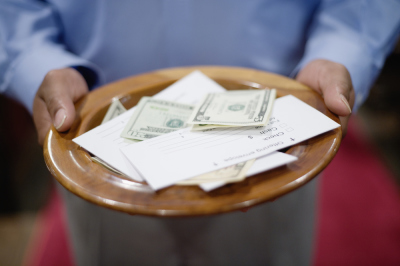Is passing the offering plate dead? 7 thoughts

For hundreds of thousands of churches, the tradition stood the test of time. The majority of churches passed the offering plate (or some type of receptacle) during a designated time of the worship service typically called “the offertory.”
There is no doubt that the number of churches passing the offering plate has decreased dramatically in recent years. And to be transparent, I am one of the traditionalists who prefer the old-fashioned passing of the offering plate. To me, it has been a powerful symbol of our act of giving. It also served as visual training for the next generation as they saw their parents and grandparents put cash, checks, or offering envelopes in the plate as it passed by.
But my role is to report what I see, not what I prefer. In light of that assignment, here are seven thoughts I have about passing the offering plate.
1. The pandemic hastened the decline of passing the offering plate. Though my evidence is anecdotal, I observed fewer churches passing the offering plate each year up to the pandemic. Of course, part of the pandemic was the quarantine when churches were not gathering for worship. And when the churches resumed gathered worship, many were hesitant to pass a plate that others had touched. Stated simply, the pandemic accelerated and exacerbated a trend already in place.
2. The number of churches passing the offering plate today is small. Matt McCraw of our Church Answers team posted a poll asking a simple “yes” or “no” question about passing the offering plate. The results are 2 to 1 in favor of the “no” response. The current percentage of no votes is 67%. Though the poll is not scientific, I would not be surprised if it’s accurate.
3. The growth of online giving has exacerbated the decline in passing the offering plate. The pandemic affected many church practices. Among the most affected was the method of giving. For the most part, the only way to give to a church was online or mail during the quarantine. Naturally, church leaders began promoting online giving more enthusiastically than ever. Now, more church members give online than don’t. And there’s not much need for an offering plate when there is no physical offering to give.
4. The growth in online giving has increased overall giving. Most churches experience increased giving as people move from plate giving to digital giving. That makes sense. You don’t forget to bring your check or cash when you give online. You give even if you are absent from worship services. Church leaders are unlikely to encourage plate giving to return since it might actually decrease giving.
5. We still need a time in worship services where we acknowledge our gifts to God. A bit of creativity is required here, and many churches are doing just that. One church uses a video testimony on giving or ministry supported by giving every week. It is called “the offertory time” just as it was when they passed the plate.
6. It is unlikely the hybrid model will continue. Simply stated, there will be fewer churches that both pass the plate and promote online giving. Some churches have boxes in the worship center that are used to return guest cards and gifts. Most of the pastors with whom I have spoken say the gifts in the box are zero or nominal.
7. The opposition to discontinuing the passing of the offering plate is largely generational. Boomers and builders are more likely to fight to do things the way they’ve always done them. That includes the passing of the offering plate. As these older generations pass from the scene, so will most of the opposition to discontinuing the passing of the offering plate.
I don’t necessarily like the trend, but I must report the data as I see it. The passing of the offering plate is dying. It will soon be dead.
Rest in peace, offering plates. You served our churches well.
Originally published at Church Answers.
Thom S. Rainer is the founder and CEO of Church Answers, an online community and resource for church leaders. Prior to founding Church Answers, Rainer served as president and CEO of LifeWay Christian Resources. Before coming to LifeWay, he served at The Southern Baptist Theological Seminary for twelve years where he was the founding dean of the Billy Graham School of Missions and Evangelism. He is a 1977 graduate of the University of Alabama and earned his Master of Divinity and Ph.D. degrees from The Southern Baptist Theological Seminary.




























